@liyuj
2016-11-24T15:13:36.000000Z
字数 5197
阅读 4234
Apache-Ignite-中文文档
构建多平台的Ignite集群:Java+.NET
Ignite集群可以由它支持的任意平台启动的节点组成,包括Java、.NET和C++。本文会介绍如何通过NuGet和Maven运行一个.NET/Java集群,作为一个示例,本文会创建一个跨平台的点对点聊天系统。
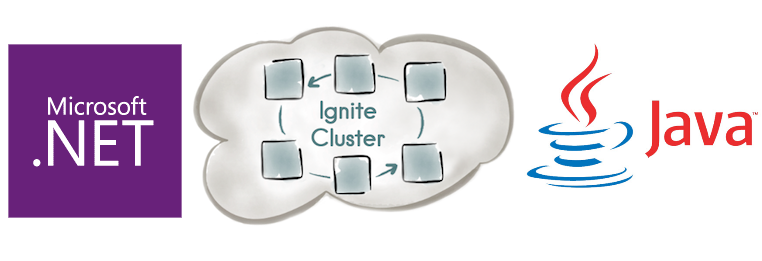
前提条件
本文适用于对Java不熟悉的.NET开发人员,反之亦然,因此描述的会比较详细。
本文会使用如下的软件:
- Visual Studio 2015(包括NuGet; 免费社区版);
- IntelliJ IDEA (包括Maven; 免费社区版)。
本文的完整源代码位于GitHub上,github.com/ptupitsyn/ignite-multi-platform-demo。
为了简洁起见,下面的代码不是很完整(公共字段,没有命名空间等)。
目标
- 连接Java和.NET节点;
- 使用Java和.NET类,通过同样的名字和字段访问Ignite缓存中的共享数据;
- 运行持续查询,观察来自另一个平台的实时数据更新。
Java工程设置
- 启动IntelliJ IDEA,然后点击“Create New Project”:

- 选择Maven然后点击“Next”:
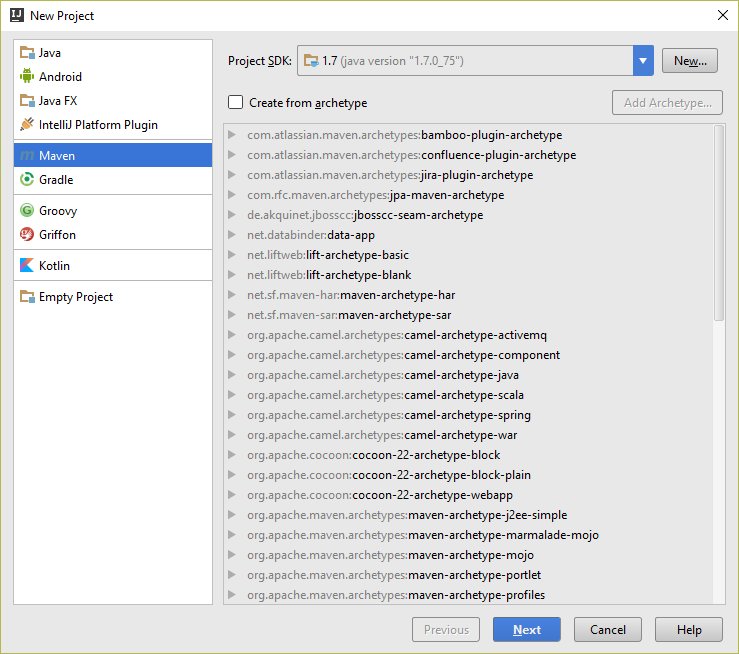
- 输入Maven信息,点击“Next”然后“Finish”:
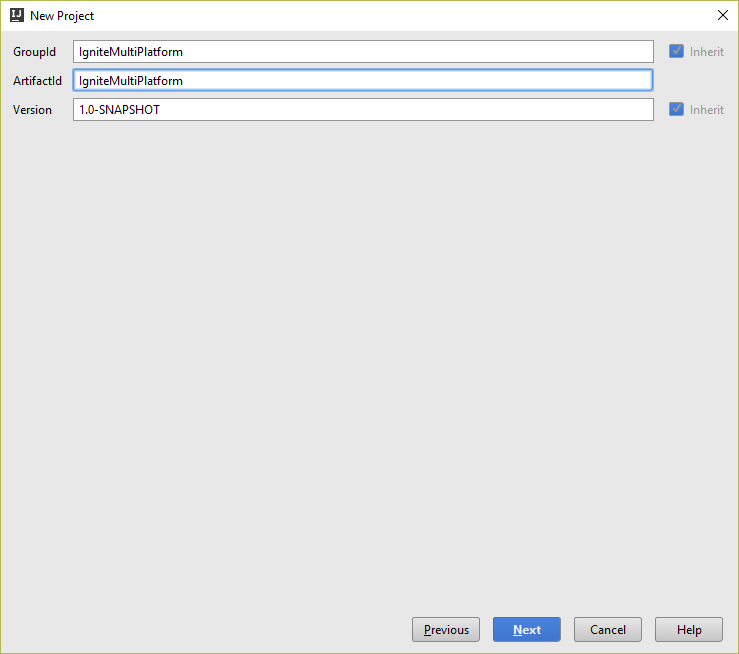
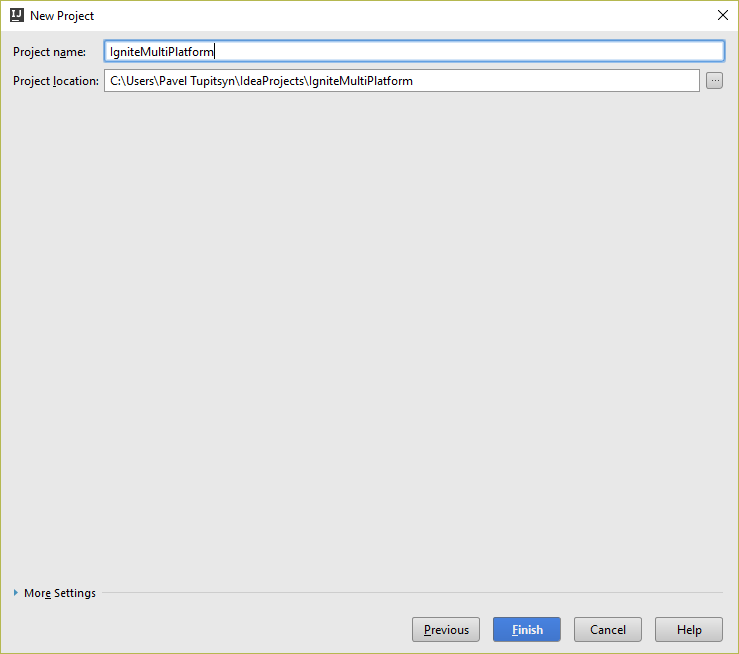
- 完成之后,会看到新项目打开的
pom.xml文件:
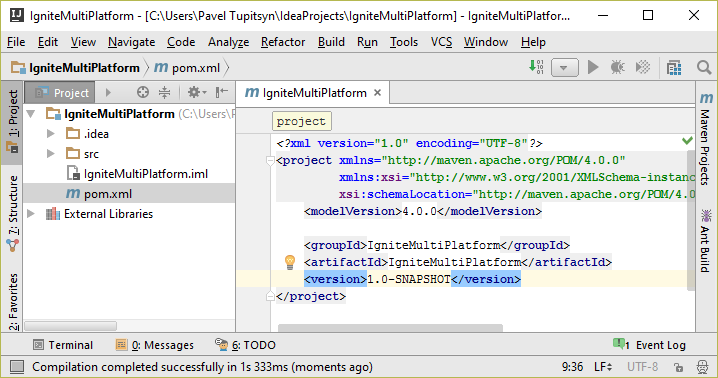
- 为
project片段增加Ignite依赖:
<dependencies><dependency><groupId>org.apache.ignite</groupId><artifactId>ignite-core</artifactId><version>1.7.0</version></dependency></dependencies>
- IDEA可能会询问是否导入项目改变,点击任意的链接:

- 在src\main\java中添加
Demo类,代码如下:
import org.apache.ignite.Ignition;public class Demo {public static void main(String[] args) {Ignition.start();}}
- 通过
Shift+F10运行,然后在IDEA的控制台上确认节点是否启动:
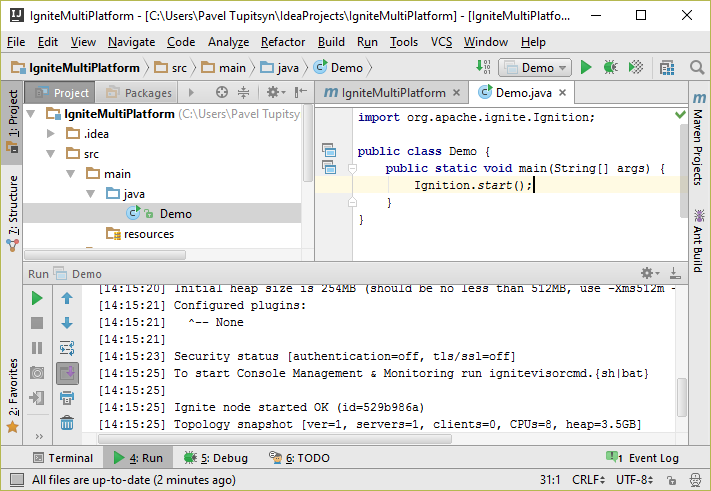
- 通过
Ctrl+F2或者停止按钮终止程序。
.NET工程设置
- 启动Visual Studio然后点击File -> New -> Project:
- 选择Visual C# -> Windows -> Console Application:
- 确保在上边选择了.NET Framework版本4及以上:

- 点击“OK”,然后就会生成一个空的控制台工程;
- 打开NuGet控制台:Menu -> Tools -> NuGet Package Manager -> Package Manager Console;
- 输入
Install-Package Apache.Ignite:
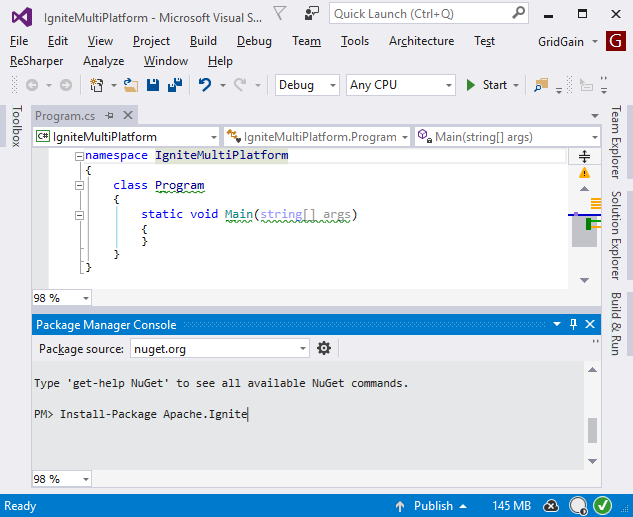
- 点击回车,然后就会输出
Successfully installed 'Apache.Ignite 1.7.0' to IgniteMultiPlatform这样的消息。 - 将
Program.cs的内容改成如下这样:
using System;using Apache.Ignite.Core;class Program{static void Main(string[] args){Ignition.Start();Console.ReadKey();}}
- 通过
Ctrl-F5启动程序,然后在控制台中确认Ignite节点已经启动:
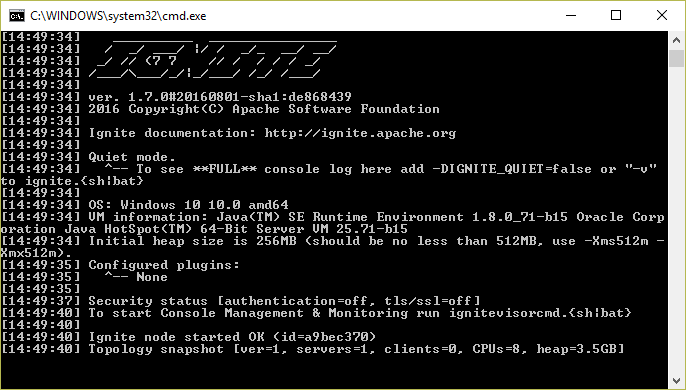
调整Java节点的配置以发现.NET节点
现在,就可以同时在IDEA中启动Java节点,在Visual Studio中启动.NET节点,这时会在他们中的一个发现如下的错误:
IgniteSpiException: Local node's binary configuration is not equal to remote node's binary configuration [locBinaryCfg={globSerializer=null, compactFooter=true, globIdMapper=org.apache.ignite.binary.BinaryBasicIdMapper}, rmtBinaryCfg=null]
这个错误是说,.NET节点在BinaryConfiguration中只支持BinaryBasicIdMapper和BinaryBasicNameMapper,需要在Java中显式地进行设置,将Ignition.start();行改成如下的代码:
BinaryConfiguration binCfg = new BinaryConfiguration();binCfg.setIdMapper(new BinaryBasicIdMapper());binCfg.setNameMapper(new BinaryBasicNameMapper());IgniteConfiguration cfg = new IgniteConfiguration().setBinaryConfiguration(binCfg);Ignition.start(cfg);
这时同时启动Java和.NET节点,验证他们可以发现对方:
[15:04:17] Topology snapshot [ver=2, servers=2, clients=0, CPUs=8, heap=7.1GB]
通过Ignite缓存进行数据交换
现在各个节点已经联通,之后会在每个平台上写一个简单的聊天程序来演示数据的交换。代码非常简单,因为API是相同的,并且语言语法也差不多。
首先,定义名字和成员完全相同的类。
Java Message类
右击src\main\java项目文件夹然后选择New -> Java Class,输入Message名字,代码如下:
public class Message {public Message(String author, String text) {this.author = author;this.text = text;}final String author;final String text;}
.NET Message类
右击Solution Explorer的项目节点,然后选择Add -> Class…,输入Message名字,代码如下:
class Message{public Message(string author, string text){Author = author;Text = text;}public string Author { get; }public string Text { get; }}
Basic映射器是区分大小写的,并且会忽略命名空间(包),因此这两个类是可以互相映射的,可以在一个平台中将Message实例注入缓存,然后在另一个平台中获取。
现在开始写聊天程序本身,逻辑比较简单:用户输入一个聊天信息,然后将其注入缓存,持续查询会收到所有的缓存更新通知并且显示他们。
Java聊天程序
将main方法的代码改成如下:
// Retrieve user nameSystem.out.print("Hi, enter your name: ");Scanner consoleScanner = new Scanner(System.in);String name = consoleScanner.nextLine();// Get or create cacheIgniteCache<Long, Message> cache = ignite.getOrCreateCache("chat");// Initialize unique ID sequenceIgniteAtomicSequence messageId = ignite.atomicSequence("chatId", 0, true);// Set up continuous queryContinuousQuery<Long, Message> qry = new ContinuousQuery<>();qry.setLocalListener(iterable -> {// This will be invoked immediately on each cache updatefor (CacheEntryEvent<? extends Long, ? extends Message> evt : iterable)System.out.println(evt.getValue().author + ": " + evt.getValue().text);});cache.query(qry);// Run the chat loopwhile (true) {System.out.print("> ");String msgText = consoleScanner.nextLine();Long msgId = messageId.incrementAndGet();cache.put(msgId, new Message(name, msgText));}
.NET聊天程序
在Ignite.NET中有两处不同(这些特性预计会在下一版本中实现):
- 需要在BinaryConfiguration中注册一个用于缓存的类型(Java会自动做这个事);
- API中还不支持Lambda表达式,需要单独地实现
ICacheEntryEventListener<K, V>接口。
因此,创建一个单独的类,代码如下:
using System;using System.Collections.Generic;using Apache.Ignite.Core.Cache.Event;class CacheListener : ICacheEntryEventListener<long, Message>{public void OnEvent(IEnumerable<ICacheEntryEvent<long, Message>> evts){foreach (var evt in evts)Console.WriteLine($"{evt.Value.Author}: {evt.Value.Text}");}}
然后更新Main方法:
// Retrieve user nameConsole.Write("Hi, enter your name: ");var name = Console.ReadLine();// Register Message typevar cfg = new IgniteConfiguration{BinaryConfiguration = new BinaryConfiguration(typeof(Message))};// Start Ignite and retrieve cachevar ignite = Ignition.Start(cfg);var cache = ignite.GetOrCreateCache<long, Message>("chat");// Initialize unique ID sequencevar messageId = ignite.GetAtomicSequence("chatId", 0, true);// Set up continuous querycache.QueryContinuous(new ContinuousQuery<long, Message>(new CacheListener()));// Run the chat loopwhile (true){Console.Write("> ");var msgText = Console.ReadLine();var msgId = messageId.Increment();cache[msgId] = new Message(name, msgText);}
结论
启动这两个节点,将两个窗口并排,输入一些消息,然后就会看到他们在另外一个窗口中立即显示。

完成!跨平台的点对点聊天程序已经创建完毕!这里没有中心服务器,任意数量的客户端都可以在任意时间加入或者离开。
作为一个练习,可以把这个做得更好:
- 将缓存模式改为
Replicated(参考缓存模式),这样每个聊天节点都会持有完整的聊天历史; - 设置
ContinuousQuery.InitialQuery属性(参考初始查询),这样每个新的节点都会立即显示之前的消息。
这个方式就是说,只要有一个节点存活,整个聊天历史就会被保存,新的节点就会在加入时显示它们。
本文译自Pavel Tupitsyn的博客:Building a Multi-Platform Ignite Cluster: Java + .NET
